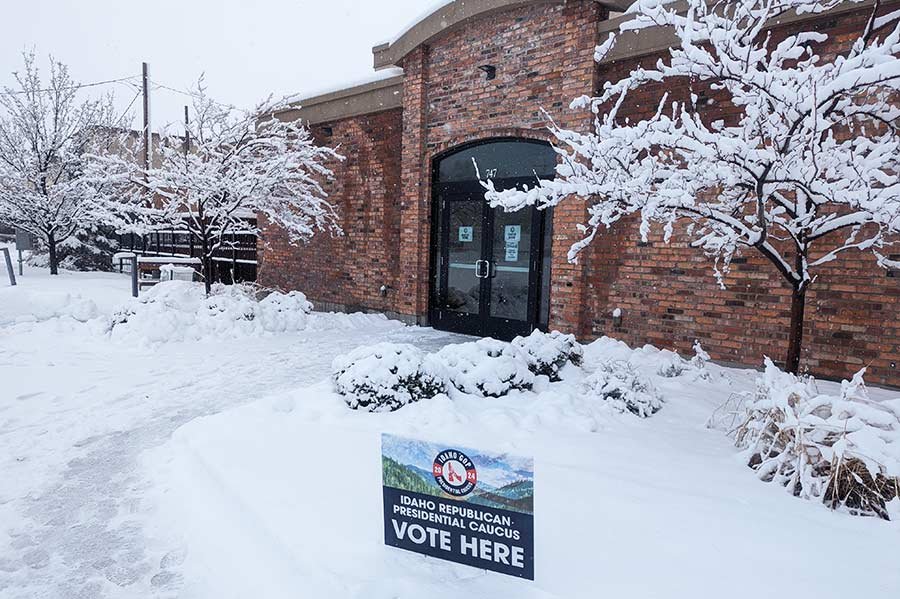Who really voted for Trump?
Idaho Republican caucus had lowest turnout in at least a decade
More than 93% of GOP voters in Idaho didn’t vote in the Idaho Republican presidential caucus Saturday, making it the lowest primary turnout in more than a decade.
Just under 7% of Republicans voted, according to data from the Idaho Republican Party, and chose former President Donald Trump to win all of Idaho’s 32 delegates for the Republican National Convention. The party reported nearly 40,000 voters who cast ballots of the 579,000 registered Republicans in the state.
The Idaho GOP organized a caucus for the first time since 2012 after the Legislature inadvertently removed the March presidential primary last year, and state leaders were unable to agree on a replacement. Caucuses differ from primaries in that they are run by political parties rather than state or local governments and are generally held on a particular day and time. Idaho’s caucus began at noon Mountain Time and 11 a.m. Pacific Time, and Republicans at locations around the state were able to vote for the next hour and a half. There was no absentee or early voting.
The last time the Idaho GOP had a caucus, in 2012, an estimated 19% of voters cast their ballots, according to data from the secretary of state’s office. That caucus had 5,000 more registered Republicans vote than the number who voted Saturday.
Turnout lower than other statewide elections in Idaho
The voter participation this year differs markedly from Idaho’s prior elections.
In 2016, when a crowded field of Republicans competed to be the next Republican president, 73.5% of Idaho Republicans participated in the March primary, according to data from the Secretary of State. Four years later, when Trump ran for a second term, 26.8% of Republicans cast their ballots for the primary.
Trump won 85% of the votes Saturday. Former South Carolina Gov. Nikki Haley was the only other candidate still in the race, while four other candidates on the ballot had dropped out.
After Democrats held a 2016 caucus, in which 34% of party members voted compared to the three-quarters of Republicans who voted in their primary, the state GOP released an infographic touting the benefits of primaries over caucuses, according to a previous Statesman article.
The state GOP said the caucus was a “resounding success, given the short time frame we had to plan and execute such a large statewide endeavor” in an emailed statement. The party said it wants the Legislature to restore the March presidential primary.
At a party event in January, GOP Chairwoman Dorothy Moon said the caucus would save the state millions of dollars, and that the party picked noon to make travel easier in potentially snowy parts of the state.
The party has blamed elected officials for removing the primary.
“The Legislature disenfranchised everyone by removing the presidential primary, and the caucus re-enfranchised as many Republican voters as possible,” Moon said in a statement last month.
Caucus time ‘excluded a lot of voters’
Some voters also had concerns about how the caucus was conducted.
Becky Martin, a Boise resident who voted at Lowell Scott Middle School, told the Statesman by phone that she was given a glossy paper ballot and a dry-erase marker to vote with. Partway through the caucus, after Martin had voted, the party volunteers realized the issue that erasable markers could cause and told voters to switch to different pens.
By 2 p.m., Martin said she watched the votes get tallied and saw that none were discounted for illegibility, meaning that hers was counted. But she said she was particularly frustrated because the party has cast doubt on recent elections and emphasized election security.
“For as much hoopla there is about stolen elections and secure elections, this just seemed really bizarre to have dry erase markers as the tool of choice,” she told the Statesman.
The GOP told the Statesman that no ballots were laminated.
Martin said she thinks the party’s decision to hold a caucus “purposefully excluded a lot of voters” and guaranteed that the number of participants would shrink. Martin added that her daughter plays volleyball and had a match Saturday afternoon, but Martin knew she could miss it because her daughter is injured. She said she normally votes absentee because her work schedule fluctuates.
“I like people being involved in our election process,” she said. “I think it’s sad when we exclude a large chunk of the state.”
At the January launch, Moon was asked by an attendee whether the party should encourage the Legislature to declare voting days holidays to try to give more people the day off. Moon said that would be unlikely to happen and that people make their own choices.
“I would prefer that people make the choice to try to save our state and save our country with a … good presidential candidate instead of sitting at home and doing other things,” she said.

